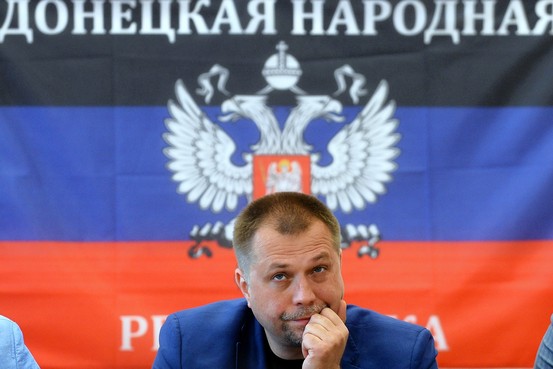Head of Donetsk Separatists Says he is Ready to Die for ‘Russian Empire’
< < Go Back
Muscovite Heading Separatist Movement in Ukraine Seeks Return of Empire.
The military noose was tightening around the rebel city, and Alexander Borodai, now the leader of pro-Russia separatists in Donetsk, was urging decisive action.
That was more than a decade ago, in a different war and a different city—Grozny, the capital of Chechnya, which was fighting for independence from Russia. Mr. Borodai, accompanying Russian troops as a war correspondent, wanted to see Grozny hit hard, all insurgents killed, and Chechen autonomy eradicated in favor of direct Moscow rule.
“Together, they will finally wipe the hated city off the face of the Earth,” he wrote of Russian soldiers preparing to enter Grozny in 2000.
Now as Ukrainian forces encircle Donetsk for a final push against pro-Russia insurgents holed up in this regional capital, Mr. Borodai, head of the rebel government, is likely to find himself on the receiving end of the kind of anti-separatist offensive he once urged.
Mr. Borodai’s sudden emergence at the helm of the pro-Russia separatist movement in Ukraine shows how Russia has struggled to find reliable local leaders in a fight the Kremlin continues to insist it isn’t inciting. His comments on Chechnya help explain the harsh worldview of a Muscovite who has nurtured an ideal of Russia for more than two decades.
Mr. Borodai, 41 years old, says he is ready to die in Donetsk for his imperial dream, which he first began working toward in the early 1990s. Back then, as a 19-year-old philosophy student in Moscow, he spent a summer fighting alongside pro-Russia rebels in Transnistria, a breakaway republic that was carved out of Moldova.
Over the weekend, the European Union banned Mr. Borodai from traveling to the EU and ordered that his assets there, if he has any, be frozen as punishment for his role in the Ukraine insurgency. Mr. Strelkov has already been sanctioned by the EU. Mr. Borodai said he’s proud to join his friend on the list, and said, “I pity old Europe,” according to Gazeta.ru, a Russian newspaper.
The prominence of Mr. Borodai and other Russian citizens at the helm of the insurgency makes any negotiated peace with Kiev harder to attain and poses an image problem for Moscow, which has argued that separatism in east Ukraine is a grass-roots movement.
“I have no idea what this person from Moscow is doing here,” said a local separatist official, who, like several other senior homegrown activists, found himself sidelined with Mr. Borodai’s arrival. “It was a raider’s takeover.”
Mr. Borodai arrived in May, after an earlier stint in Crimea where he helped midwife the Russian annexation behind the scenes. as an adviser to Crimea’s separatist boss.
He shuttles between Donetsk and the Russian capital, eluding Ukrainian forces, and crossing the Russian border at will. In Moscow, he gives interviews to state-controlled media, and holds meetings, though he refuses to say with whom, citing a “military secret” during a news conference he gave in Donetsk a couple of days ago.
Here he acts with near-absolute authority. At a recent news conference, he gave its popular mayor an ultimatum—side with the separatists or step down. He explained his order: “To step down doesn’t mean to stand against the wall and face a firing squad.” Over the weekend, he demanded that local businesses pay taxes to the separatists.
He believes autocracy is the best form of government, though he says he could cede power if a credible homegrown alternative emerges. He believes he is fulfilling a historical mission on behalf of the Russian nation, which he calls a “super-ethnicity” glued together with Orthodox Christianity.
“The boundaries of the Russian world are considerably larger than the boundaries of the Russian Federation,” Mr. Borodai, a pistol holstered on his belt, said in an interview in his spacious Donetsk office, with unadorned except for a picture of Russian President Vladimir Putin hanging above his desk.
Asked about the irony of calling for the annihilation of Chechen separatists—given that he is now a separatist himself—Mr. Borodai paused and offered this: “I’m in the same exact situation; I’m now also fighting against separatists, not Chechen separatists, but Ukrainian separatists. Because there’s Russia, the great Russia, there’s a Russian empire. And now the Ukrainian separatists who are in Kiev are struggling against the Russian empire.”
More From The Wall Street Journal (subscription required):




